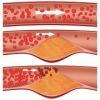Article
Biologic Agent Evolocumab Ushers in a New Era in Cholesterol-lowering Therapy
Author(s):
Study results presented at ACC.14 show treatment with PCSK9 inhibitor evolocumab significantly reduces LDL-cholesterol levels in patients with hypercholesterolemia.

Evolocumab, a biologic agent targeting a protein that impedes the liver’s ability to scrub low-density lipoprotein cholesterol (LDL-C) from circulation, has early and persistent ability to lower LDL-C across a wide range of risk profiles, say researchers. An overflow audience heard the results of the DESCARTES and MENDEL-2 trials of the monoclonal antibody evolocumab at successive presentations at the American College of Cardiology 2014 Scientific Session in Washington, DC on March 29, 2014.The drug is one of a novel class of investigational agents targeting proprotein convertase subtilisan/kexin type 9 (PCSK9).
Dirk Blom, MD, PhD, of the University of Cape Town (South Africa), presented the first study. In DESCARTES (Durable Effect of PCSK9 Antibody Compared with Placebo Study), 901 study subjects were randomized -- according to baseline LDL-C and cardiovascular risk determined by NCEP-ATPIII --to monthly evolocamab 420 mg SC or placebo, along with one of four other lipid-lowering therapies. These ranged from diet to atorvastatin at 10 or 80 mg/day to atorvastatin 80 mg + ezetimibe. Subjects, whose LDL-C was at or over 75 mg/dl after a four-week lead-in, showed a mean treatment difference in LDL-C of 57% (95% CI) at one year, a level sustained after a speedy reduction to essentially the same level at 12 weeks. Other cardiac risk markers also improved, including reduction in triglycerides, ApoA 1, ApoB, Lp(a), and increased HDL-C. The minimal adverse event incidence in the placebo and treatment groups was similar. Outcome data are being collected but have not yet been reported.
The MENDEL-2 trial, presented by Michael Koren, MD, of the Jacksonville (FL) Center for Clinical Research, compared evolocumab (administered biweekly or monthly), alone and in combination with ezetimibe, with placebo. Study subjects, ages 18-80 with fasting LDL-C levels >/=100 and <190 mg/dl and Framingham risk scores of 10% or less, were randomized to one of the six possible treatment arms and followed for 12 weeks. The 614 subjects averaged a 55-57% reduction in LDL-C over placebo, as well as a 38-40% greater reduction in LDL-C than ezetimibe. The results were highly statistically significant, reaching P<0.001 for all results. There was no clinical difference between the biweekly and monthly evolocumab arms. As in the DESCARTES trial, favorable changes were also seen in the profile of other lipoproteins, and adverse events and laboratory abnormalities were minimal and similar among all treatment arms.
In remarks during a March 30 press conference, Peter Libby, MD, chief of the Division of Cardiovascular Medicine at Harvard Medical School, commented broadly on the implications of these studies, along with other monoclonal antibody studies presented at ACC-14. “We are at a dawn in the era of biologics,” he said. Calling the new research a “breakthrough in the field of cardiology,” he noted that the use of biologics have transformed the practice of rheumatology and are being used increasingly in oncology as well. He also had words of caution, remarking that though the safety profile of new cardiovascular biologic agents appears favorable, longer-term studies may unveil concerns. He is eager, he says, to see the results of the studies to come. “The proof of the pudding is in these long-term outcome studies.”




